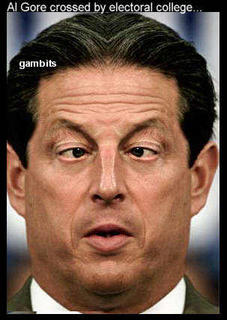
Former Veep enters the Blame Game, . . .
Al Gore jumps into the frey, with his own version, using his self-appointed expert status on Enviro-issues.
Hurricane Katrina offered “a taste” of the disasters, and the response to them, that the US could expect as a consequence of climate change, former vice president Al Gore said on Saturday.
He cited recent research that found warmer sea surface temperatures - a result of global warming - had strengthened hurricanes and major storms around the world. Speaking at the Clinton Global Initiative in New York, where climate change was one of the key issues under discussion, he also criticised those politicians he said wanted to trim government too far, as weak government was incapable of responding adequately to emergencies.
He said: “Katrina is the first sip, the first taste, of a bitter cup that will be proffered to us over and over again. It is up to us [to tackle climate change], and it does involve accepting that there is a legitimate role for government.”
Mr Gore spoke out against the proposed suspension of certain environmental regulations, which some have argued are necessary to deal with Katrina's aftermath: “The response to Katrina should not be to suspend environmental laws and to cut taxes once again.”
Kofi Annan, the secretary general of the United Nations, also spoke out in favour of swifter action on climate change. The UN will face stiff negotiations in November at the next round of meetings on the Kyoto treaty on climate change, which binds developed nations to reduce their greenhouse gas emissions. Its provisions expire in 2012, and at present there is nothing to replace it.
The US administration of President George W Bush, which has rejected the treaty, opposes opening up negotiations on its future, calling such moves “premature”.
In a challenge to the Bush position, Mr Annan said: “It is time we began to prepare the next steps, where negotiations are required to bring a multilateral, universal approach [to greenhouse gas emissions and climate change].”


0 Comments:
Post a Comment
<< Home